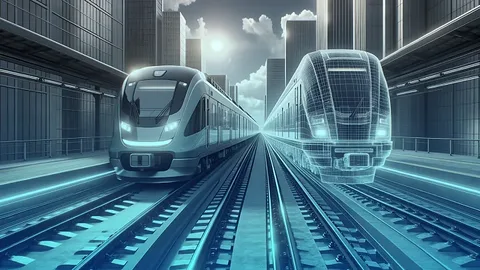The railway industry is a complex ecosystem of interconnected systems, all working in harmony to ensure safe and efficient transportation. At the heart of this system lies a seemingly simple yet crucial component: the bearing. From locomotives to train cars, and even signaling equipment, bearing applications are ubiquitous and play a vital role in ensuring smooth operation and minimizing downtime. This blog will delve into the expanding world of bearings in railways, highlighting their critical functions and the latest advancements that shape the future of railway mobility.
The Unsung Heroes of the Rails: Why Bearings Matter
Bearings are essentially mechanical components that reduce friction between moving parts. In the context of railways, this translates to:
- Enabling smooth wheel rotation: Bearings allow train wheels to rotate freely on axles, minimizing friction and maximizing efficiency.
- Supporting heavy loads: Railway bearings are designed to withstand immense static and dynamic loads, ensuring the safe transport of passengers and cargo.
- Reducing energy consumption: By minimizing friction, bearings contribute to lower energy consumption, reducing operational costs and environmental impact.
- Extending equipment lifespan: High-quality bearings protect axles and other critical components from wear and tear, extending their lifespan and minimizing maintenance requirements.
- Ensuring safety: Reliable bearings are critical for ensuring the safe operation of trains. Bearing failures can lead to derailments and other accidents, highlighting the importance of using high-quality components.
Beyond Wheelsets: Diverse Bearing Applications in Railways
While wheelset bearings are perhaps the most well-known application, bearings play a much broader role within the railway system. Here are some other crucial areas where they are utilized:
- Locomotive Engines: From crankshaft bearings to connecting rod bearings, these components are essential for reliable engine performance. They are built to withstand very high temperatures and dynamic loads.
- Gearboxes and Transmissions: Bearings support the gears and shafts within gearboxes, facilitating smooth power transfer and efficient operation.
- Traction Motors: Traction motors use bearings to support the rotating armature, enabling the conversion of electrical energy into mechanical motion.
- Suspension Systems: Bearings are utilized in suspension systems to provide smooth and controlled movement, enhancing passenger comfort and reducing wear on the tracks.
- Door Systems: Automatic doors rely on bearings for smooth and reliable operation, ensuring easy access for passengers.
- Signaling Equipment: Precision bearings are utilized in signaling systems to ensure accurate and reliable switching, contributing to safe train operation.
- Auxiliary Systems: Bearings are also used in a variety of auxiliary systems, such as pumps, compressors, and air conditioning units.
Modern Bearing Technologies: Driving Innovation in Railways
The railway industry is constantly evolving, and so are the bearing technologies that support it. Modern railway bearings incorporate several key advancements:
- Improved Materials: High-strength steels, ceramics, and advanced polymers are used to enhance bearing durability, load-carrying capacity, and resistance to wear and corrosion.
- Advanced Lubrication Systems: Optimized lubrication systems ensure consistent and effective lubrication, minimizing friction and extending bearing life. Automatic lubrication systems are increasingly popular.
- Condition Monitoring Systems: Integrated sensors and monitoring systems provide real-time data on bearing performance, allowing for predictive maintenance and preventing unexpected failures.
- Sealed and Pre-lubricated Bearings: These designs reduce maintenance requirements and prevent contamination, ensuring reliable performance in harsh environments.
- Tapered Roller Bearings: Designed to handle both radial and axial loads, tapered roller bearings are commonly used in wheelsets to provide robust support and smooth rotation.
- Spherical Roller Bearings: These bearings are self-aligning and can accommodate misalignment, making them ideal for applications where shaft deflection is a concern.
The Future of Railway Bearings: Trends and Innovations
The future of bearing application in railways is focused on:
- Smart Bearings: Integrating sensors and data analytics to predict failures and optimize maintenance schedules.
- Lightweight Bearings: Utilizing advanced materials like composites to reduce weight and improve fuel efficiency.
- Environmentally Friendly Bearings: Developing bearings that use biodegradable lubricants and minimize environmental impact.
- Customized Bearing Solutions: Tailoring bearing designs to meet the specific requirements of different railway applications.
- Increased focus on sustainability: Focusing on bearings that require less lubrication and have longer lifespans to reduce waste.
The ongoing development and implementation of these innovative bearing technologies will be critical to ensuring the safety, efficiency, and sustainability of railway systems for years to come. As the demand for rail transport continues to grow, the role of high-performance bearings will only become more important.
Conclusion
Bearings are the unsung heroes that underpin the functionality and safety of the railway industry. From the critical wheelset bearings that enable smooth travel to the specialized bearings within locomotive engines and signaling systems, their reliable performance is paramount. Industry is constantly evolving, demanding innovative bearing solutions that enhance durability, reduce maintenance, and minimize environmental impact. For businesses seeking to enhance the performance and longevity of their heavy vehicles or equipment, investing in high-quality bearings is crucial. KG International is a leading distributor of varied and top-notch bearings in the industry. Sourcing your bearings from trusted suppliers like KG International ensures you receive reliable components designed to withstand the rigors of demanding railway operations and beyond.








